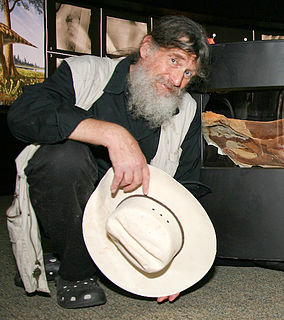A Quote by Robert T. Bakker
Often extinctions in the ocean occur at the same time as those on land. Then again, the ice age extinctions lost many big animals, but not many sea faring ones.
Related Quotes
With respect to phenomena like mass extinction, somebody might say why worry about it because in a geological perspective mass extinctions aren't so bad, they wipe out some things and then 10 million years down the road we get new and interesting objects.But I tell you mass extinctions are really awful for folks caught in the midst of them.
There's this Indian fellow who worked out a cycle like the idea of stone-age, bronze-age, only he did it on an Indian one. The cycle goes from nothing until now and 20th century and then on and right around the cycle until the people are really grooving and then just sinks back into ignorance until it gets back into the beginning again. So the 20th century is a fraction of that cycle, and how many of those cycles has it done yet? It's done as many as you think and all these times it's been through exactly the same things, and it'll be this again.
Climate has always changed. It always has and always will. Sea level has always changed. Ice sheets come and go. Life always changes. Extinctions of life are normal. Planet Earth is dynamic and evolving. Climate changes are cyclical and random. Through the eyes of a geologist, I would be really concerned if there were no change to Earth over time. In the light of large rapid natural climate changes, just how much do humans really change climate?
We tell our children they're trapped like rats on a doomed, bankrupt, gangster-haunted planet with dwindling resources, with nothing to look forward to but rising sea levels and imminent mass extinctions, then raise a disapproving eyebrow when, in response, they dress in black, cut themselves with razors, starve themselves, gorge themselves, or kill one another.
I think the most remarkable thing about ice, in my opinion at least, is that it occurs in many, many, many different forms. Most solids occur in typically one or maybe two or three different forms, and ice has approximately 15 different crystal forms, as well as two forms that are called amorphous, which means without any shape at all.
As one sees a river pass into the ocean, lose itself in it, its water for a time distinguished from that of the sea, till it gradually becomes transformed into the same sea, and possesses all its qualities; so was my soul lost in God, who communicated to it His qualities, having drawn it out of all that it had of its own. Its life is an inconceivable innocence, not known or comprehended of those who are still shut up in themselves or only live for themselves.
People get overwhelmed with folklore as fact. Take the Exodus. The Exodus did not occur. It could not have occurred. Wasn't necessary for it to occur. The Jews walked into Africa over a 16-mile land until they built the Suez Canal - that land is still there. Why would they have to leave by the sea. They didn't come by the sea. Certain people think you are against their religion when you use common sense.

































